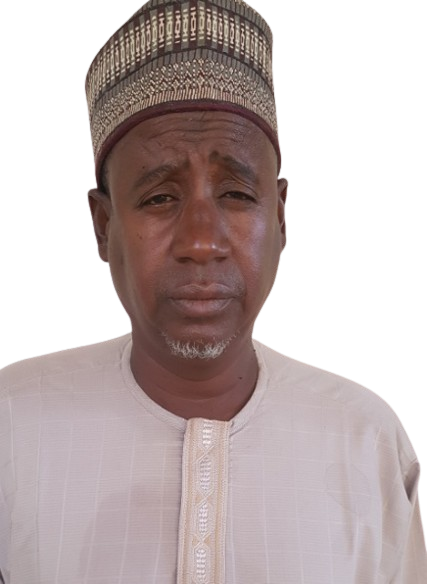Prof. Usman Ahmad Karofi

Brief Biography
Dr. Usman Ahmad Karofi, a Reader (Associate Professor) of Criminology. He is 59 years of old, a native of Karofi, Dutsin-ma Local Government Katsina State (Nigeria). He is a father of ten children: Ahmad Usman Karofi (Bsc. Computer UDUS): Ishaq Usman Karofi (Bsc. Sociology SSU): Ibrahim Usman Karofi (Bsc, Nursing UDUS): Fatima Usman Karofi (Bsc. Biology UDUS): Abdallahi Usman Karofi and Osama Usman Karofi (Currently Student of Physics and Chemistry at UDUS) and Amina Usman Karofi, Mardiyya Usman Karofi, Abubakar Usman Karofi and Abdulganiyu Usman Karofi all Student of (ChaliphateTarbiya Academy, Sokoto). He is a holder of PhD in Criminology. Other qualifications he obtained include Primary Leaving Certificate1976, General Certificate of Education 1981, IJMB 1982. He obtained his first degree in Sociology from Amadu Bello University Zaria in 1987, Masters of Criminology from University of Ibadan 1990. He obtained Post Graduate Diploma of Management and Masters of Business Administration at Usman Danfodiyo University Sokoto 1998 and1999 respectively. He obtained his PhD in Criminology UniversitiSains Malaysia, Penag Malaysia. In March 1989 he joined the Department of Sociology Usman Danfodiyo University Sokoto where he has been handling courses in Sociology of Crime and Delinquency, Sociology of Deviant Behavior, Introduction to Sociology, Introduction to Social Problem, Elements of Scientific Thought, Sociology of the Family, Political Sociology, Introduction to Anthropology. He has been Coordinator of Diploma of Crime Prevention Management and Control of the Department of Sociology. He has serve as Examination Officer for the Department of Sociology and he has been post graduate coordinator of the Faculty of Social Sciences and Department of Sociology. He has been the Head of Department between 2014 to 2018. He supervises quite a number of under graduate project, Masters, MPhil and PhDs. He has published extensively both national and international journals, inaddition he attended a number of conferences, seminars and workshops (local and international). He has been visiting lecturer with the Department of Sociology Federal University BirninKebbi, Federal University Dutssin-ma and Alqalam University Katsina. External examiner national Open University,Abuja and Department of Sociology Sokoto State University, Sokoto from 2013 to date. He was on sabbatical leave with the Department of Sociology Federal University Dutsin-ma 2014 to 2015 academic session. He was awarded/ granted another sabbatical leave at National Institute for Legislative and Democratic Studies National Assembly Abuja, between November 2019 to November 2020. From 2008 - (Aug. – Jan.) 2009 he has worked as Consultant (Qualitative Research Coordinator) for United Nations Population Fund (UNFPA) for Evaluation of its End line/Baseline Survey of its Country Programme in Kebbi, Katsina State, Nigeria. A report that has been published. In2009- December he was a consultant of Partnership on the Revival of Routine Immunization in Northern Nigeria: Assessment of Financial Burden of Emergency Maternal Health Care in Katsina and Yobe States, Nigeria. A report that has been published. Professionally, he is a member of the following academic and professional bodies 1.Member- Nigerian Criminological Association 2.Member- Nigerian Sociological Association 3.Member- Nigerian Anthropological and Sociological Association (NASA) 4.Member Aid Action Research Group Malaysia| Area of specialization: | Crime and Deviance, Social problems, Law and Society |
| Email: | |
| Phone: |
List of Selected Publications
1. Karofi U. A (1996) Toward an Effective CrimeControl Strategies in Nigeria, In IBOM Journal of Social Issues volume 3 no. 1. Vol. 3 No. 1. Pages 15 - 19 ISSN 1117-4110. Index2. Karofi U. A (2005) Drug Abuse and Criminal BehaviourIn Penang, Malaysia: A Multivariate Analysis, in Bangladesh e-journal of Sociology Volume 2. Number 2. July 2005.Pages 90 - 116 Available on line at:http:// www.bangladeshsociology.org/ Content.htm or http://www.bangladeshsociology.org/BEJS%202.2%20-%20Karofi%20-%20Drug%20Abuse.htmISSN 1819-8465. Index
3. Karofi U. A and Mwanza J. (2006) Globalization and Crime in Bangladesh e-journal of Sociologyin Bangladesh e-journal of Sociology V.3.1 (2006). ISSN 1819-8465. Index
4. Umar M. S. and Karofi U. A (2007) Non-Work Factors and Labour Turnover among Female Employees in Kebbi State Civil Service:, in Bangladesh e-journal of Sociology Volume 4. Number 2. July 2007.Pages 38 - 44 Available on line at:http://www.bangladeshsociology.org/Content.htmISSN 1819-8465. Index
5. Karofi U. A (2009) Approaches to Social Research (2009) IN Proceeding of International Conference on Research and Development Vol.2 N.30, 2009 pg.15-22
6. Karofi U. A (2010) Drug-Crime Nexus: An Alternative explanation inBayero. Journal of Social Management Studies, B.U.K., VoI.13, Number 2 Pp. 35-45 ISSN 2141-9450.
7. Karofi U. A (2012) Rethinking on Drug Abuse and Crime Relationship:An Alternative Explanation for Intellectual Criminologist. Mediterranean Journal of Social Sciences Vol. 3, No. 16, December 2012Pages 11 – 28I E-ISSN 2039-9340. Index
8. U. I. Ndashiru and Karofi U. A (2012). Drug Abuse, Youth Violence and Social Order: A Study of Petroleum Hawkers in Minna, Niger State, Bangladesh e-journal of Sociology. V 9.2 2012. ISSN 1819-8465. Index
9. Karofi U. A (2013) Pattern and the Etiology of Corruption in Nigeria: Views expressed by senior Immigration Officials. An Alternative Explanation for Intellectual Criminologist. Nigerian Sociological Review Vol. 6, No. 1, April 2013. Pages 79- 94 ISSN 1596- 6151.
10. Zamare U. S. and Karofi U. A 2014). The role of the Shariah Legal System in the Prevention and Control of crime in Kebbi State, North-western Nigeria Journal of Research in Humanities and social Sciences International Institute of Science and Technology and Education.Pages 154-159 ISSN (Paper) 2224-5766. Index
11. Zamare U. S. and Karofi U. A (2015). National unity: A Catalyst for Sustainable Democracy in Nigeria. Journal of Developing Countries Studies VL 5.8, 2015 ISSN 2224.607x (Paper). Index
12. Robinson J. O. andKarofi U. A (2019).The Dark Side of the Ivory Tower: An Analysis of Commercial Sex work in Nigerian University.V.5.5 An International Peer-Reviewed Journal on Humanities and Social Sciences. ISSN 2394-451X (Print) and Open Access. Index
13. Dansabo M. T, and Karofi U. A (2020). Insecurity as a Development Challenges: A Study of Northwestern Nigeria:Journal of Criminology Sociology and Law http://www.journalcriminology.com/JCSL, 2020, Volume 1, Issue 1, p. 38-53. ISSN 2734-2328. index
14. Amadi, F. and Karofi U. A (2020).The Impact of Pipeline Vandalism on National Security and Development in Nigeria:The Niger Delta Experience:JCSL, 2020, Volume 1, Issue 1, p54-63 ISSN 2734-2328.index
15. Uzoigwe G. E.,Karofi U. A and Abubakar A. (2020).The effects of Social Media on Student’s Academic Performance: Sokoto Journal of Social Sciences. Vol.1. No 1. index
16. Abubakar A. andKarofi U. A (2020).Internal Displacement and Emerging Begging Practices InBornoSatate, Nigeria: Sokoto Journal of Social Sciences. Vol.1. No. index
17. Karofi U. A and H. U. Malami (2004) “Dimension AndChallenges of Poverty to Human Development in Nigeria”: in Issues in Economics Volume one Pages 202-212. Department of Economics UsmanuDanfodiyoUinversity, Sokoto. Published by University Press UsmanuDanfodiyo University SokotoISBN 978-36144-7-9.
18. Karofi U. A (2012) Crime Control, Prevention and Sustainable Development inNigeria In D. A. Abdulraham, I.S. Ogundiya, T. Garbaand I.M. Dankani (ed). 50 years of Nigerian Nationhood Issues and Challenges for Sustainable Development. A publication of the Faculty of social Sciences. UsmanuDanfodiyo University, Sokoto. Pages 354 – 369. NSBN 978-35511-7-5
19. Karofi U. A (2014) White Collar Crime and Corruption: Conceptual andTheoretical View. In M. Z. Umar, S.D. Abubakar, I.M. Dankaniand N. C. Okolo(ed). Contemporary Issues in Nigeria’s National Development.A publication of the Faculty of Social Sciences. UsmanuDanfodiyo University, Sokoto.Pages 193 – 201I SBN: 978-125-562-5.

